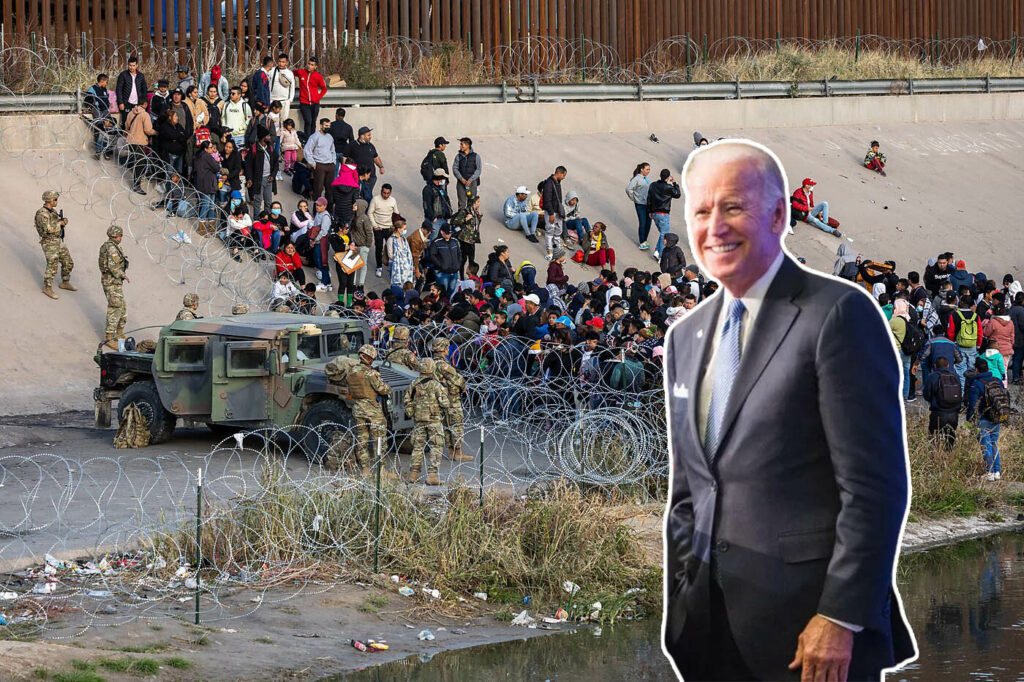
- President Biden’s approach to immigration has faced significant criticism, with several perceived failures contributing to the challenges at the U.S.-Mexico border.
- The Biden administration’s failure to enforce federal immigration laws, containing illegal immigration, inadequate detention policies, and choice of equity over law enforcement has resulted in a grave threat to US national security.
- Biden’s failure to resolve the Texas border crisis could also have humanitarian consequences resulting in demographic shifts in several states.
In recent years, the Texas-Mexico border has become a flashpoint of contention between state and federal authorities, primarily due to a surge in illegal border crossings. The intricacies of the issue have led Texas Governor Greg Abbott to implement Operation Lone Star, a state-level initiative launched in March 2021 to address the escalating challenges at the border.
At the heart of the matter are the substantial encounters between the US Border Patrol and individuals attempting illegal border crossings, with a significant portion occurring in Texas border sectors. In response, Texas deployed the Texas National Guard and additional law enforcement resources to enhance border security. Tensions further heightened as Texas strategically placed concertina wire along the border, sparking disagreements with the Border Patrol over its impact on their operational flexibility.
This conflict evolved into a legal battle when Texas filed a lawsuit against the Border Patrol, seeking to halt the removal of the concertina wire. The legal dispute eventually reached the Supreme Court, resulting in a temporary injunction against further wire removal. However, the situation took a tragic turn on January 10, 2024, when Texas seized control of Shelby Park, denying Border Patrol access and leading to the drowning of a Mexican woman and two children.
Governor Abbott, asserting constitutional authority, declared the situation an invasion, citing the state’s right to defend itself. The Supreme Court vacated the injunction, granting Border Patrol access. Despite the Department of Homeland Security’s subsequent request for entry to Shelby Park, Texas adamantly refused, arguing against transforming it into an “unlawful port of entry.” The legal saga is set to continue, with Texas slated to present its case on February 7.
Governor Abbott’s resolute stance, supported by 25 Republican governors, raises fundamental constitutional questions about states defending themselves against perceived invasions. Legal scholars, however, argue that the concept of invasion, as envisioned by the Founding Fathers, specifically pertains to armed hostility from foreign entities.
While acknowledging the gravity of the illegal immigration issue, the experts suggest that practical solutions, such as expanding legal immigration channels, could effectively address the challenges without resorting to extreme measures. They underscore the importance of tempering rhetoric and relying on established legal processes to de-escalate the situation and find sustainable solutions.
Biden Administration Fails in Handling the Situation
President Biden’s approach to immigration has faced significant criticism, with several perceived failures contributing to the challenges at the U.S.-Mexico border:
1. Refusal to Enforce Federal Immigration Laws: Critics argue that President Biden has failed to fulfil his constitutional duty to enforce federal immigration laws. The Immigration and Nationality Act (INA) mandates the detention of individuals entering the U.S. without proper documentation until their claims can be adjudicated, a requirement that is allegedly being ignored.
2. Surge in Illegal Immigration: Biden’s policies, particularly the perceived leniency towards asylum seekers, have reportedly led to a surge in illegal immigration. The understanding that individuals may be released into the U.S. has encouraged more migrants to attempt the journey, overwhelming border resources.
3. Inadequate Detention Policies: The administration’s claim of insufficient detention space has been challenged. Critics argue that the reduction in detention capacity, despite having the capability to hold more individuals in the past, is a self-inflicted obstacle that hampers effective immigration enforcement.
4. Equity Over Law Enforcement: Biden’s emphasis on “equity” in immigration enforcement, as opposed to prioritizing law enforcement, has raised concerns. Critics argue that the administration’s focus on equity has effectively led to the substitution of a de facto new immigration policy, which may not align with Congress’s duly passed policies.
5. Impact on National Security: The surge in encounters between the U.S. Border Patrol and individuals on the terrorist watch list is seen as a direct consequence of the porous border. Critics contend that an unsecured border poses a significant national security risk, allowing potential threats to enter the country undetected.
6. Humanitarian Consequences: The failure to effectively manage the border has led to tragic consequences, including a record number of migrant deaths. Reports of up to 30 bodies a month found in the Rio Grande near Eagle Pass, Texas, highlight the humanitarian toll of an uncontrolled border.
7. Demographic Shifts: The significant increase in the foreign-born population over the age of 16 during the first two years of Biden’s term has raised concerns about the long-term demographic impact. Critics argue that such rapid demographic changes may have socio-economic implications that need careful consideration.
In evaluating President Biden’s immigration policies, the refusal to enforce laws, a surge in illegal immigration, and the prioritization of “equity” over law enforcement pose significant challenges. The potential impact on national security, coupled with the human toll and demographic shifts, underscores the urgent need for a thoughtful reassessment. Addressing these issues requires a balanced approach that upholds both the rule of law and compassion, as the nation navigates through complex and consequential decisions.
(Charushi Chakole is a postgraduate student in International Relations at Amity University, Raipur. She writes articles and research papers regularly on international affairs and geopolitics.)
